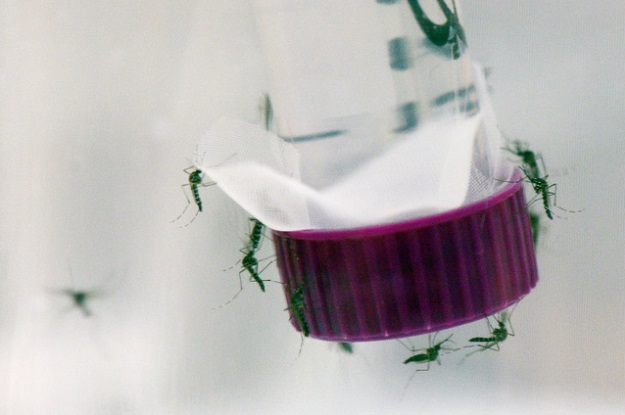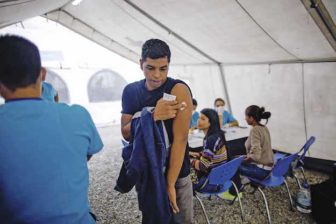When it comes to the Zika virus’ impact on Venezuela, it’s the government’s word versus Google and Twitter.
Based on data gathered in part from the search engine and social network, the watchdog health group Observatorio Venezolano de la Salud (OVS) estimates that nearly 700,000 people have been infected with Zika in Venezuela. That’s around 150 times higher than the government’s last tally of 4,700 in late January, and also above other recent independent estimates. If accurate, it would make Venezuela the world’s hardest-hit country outside of Brazil – putting ever more strain on a national health system that has already seen shortages of medicines and medical equipment.
The OVS’ estimate is just that – it is not an exact count. Instead, it is based in part on an algorithm that the organization developed after consultations with Google and Twitter. The algorithm uses data from Google Trends to monitor the prevalence of “Zika,” “dengue,” “chikungunya,” and other key words used by Venezuelans on social media and other internet sites. The initiative is part of a growing trend among doctors and health organizations of using analytics culled from online sources to understand the spread of diseases, from Ebola to H1N1.
There is reason to believe that this type of data can offer an accurate picture of how diseases behave. Julio Castro Méndez, a professor of tropical epidemiology at Universidad Central de Venezuela with experience in computer programing, is leading the OVS’ analytics study. In an interview with AQ, he noted a high correlation between the results predicted by the OVS algorithm and limited official data that is being made available from Venezuela’s Ministry of Health. For example, the ministry’s reported cases of dengue correlate about 95 percent with what the algorithms predict, according to Castro.
The huge gap between the OVS’ figures and those presented by the government is also consistent with other sources. In addition to search and social media data, the OVS’ estimate is informed by numbers obtained from the non-profit health agency Network to Defend National Epidemiology, which in January estimated there had already been 400,000 cases of Zika in Venezuela, based on health reports that had not been made public. The Venezuelan Society of Public Health in January also concluded there had been at least 400,000 Zika cases based on polling of health officials.
“You have to put this in the context of Venezuela,” Castro told AQ in a phone interview. “The government hasn’t accepted 200 percent inflation. They haven’t accepted the high rate of homicides. They haven’t accepted the problem with medication. And they haven’t accepted Zika.”
The Venezuelan Embassy in Washington D.C. did not respond to AQ’s requests for comment, and Venezuelan health ministry officials have declined to comment to the international press on the issue.
Zika has spread to at least 44 countries or territories, according to the U.S. Centers for Disease Control and Prevention (CDC). While Brazil and Colombia have each declared a state of emergency over the mosquito-borne virus and launched national awareness campaigns, Venezuela has downplayed the epidemic to the point of refusing to release a weekly health bulletin.
There will always be some discrepancy between suspected cases of Zika, which occur when a person shows clinical features of the virus, and confirmed cases of Zika, which require a laboratory diagnosis. But in Venezuela, where there is a lack of official data on suspected or confirmed cases, OVS and other academic organizations have turned to alternative means of gathering data that might reflect the full impact of the disease.
It was this information blackout that spurred Castro to reach out directly to Silicon Valley tech companies last year. His aim was to develop algorithms that could filter Google’s search data and Twitter’s social media information into a picture of Zika’s true impact on Venezuela. “Since we encountered a lock on information, we needed to create different data,” said Castro. “It gives a picture of how big the epidemic is.”
The OVS estimate might even be low. Venezuela has seen about 800 cases of the Zika-linked immune disorder Guillain-Barré syndrome (GBS) since late last year, according to Castro. He said it is “generally assumed” that there is a 1 to 1000 relationship between GBS and Zika, which would translate into an estimated 800,000 cases of Zika in Venezuela.
The numbers are high, but not surprising given Zika’s epidemic proportions in Brazil and Colombia, which have reported about 1.5 million and 72,000 cases, respectively. Colombia’s health authority predicts more than 600,000 citizens will be infected with the virus this year. Castro’s algorithms also led him to conclude that GBS was at its height appearing in Venezuela at a rate of about 100 new cases per week, which was in line with the official government tally.
More than just a tool for Venezuela, OVS’ algorithms may soon become available for other countries as well. In a forthcoming peer-reviewed research paper, Castro will explain in further detail his methods so that other groups might use social media to combat misinformation and fill in data gaps. Castro has already traveled to Ecuador to share his work and explain how it can be used to collect health data.
To be sure, there are limitations to this approach, most obviously when it comes to assessing remote villages and other areas that lack internet connectivity or where people are less active on social media. But Dr. Marianella Herrera Cuenca, director of OVS, argues that it’s better than nothing.
“We do hope it will become a model for other countries,” said Dr. Herrera. “If you address the problem in a proper way, you will probably have the right outcome when you propose the actions. If you don’t address the problem, you can’t have the right actions.”
—
Kurczy is a special correspondent for AQ.








